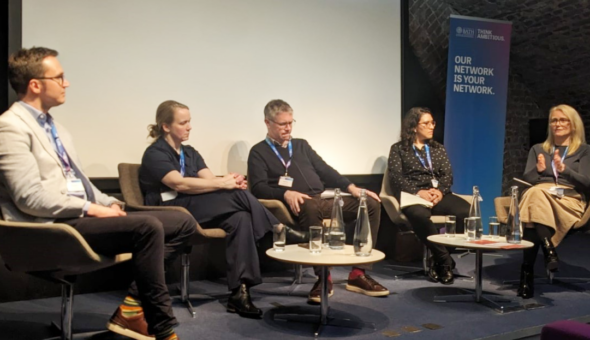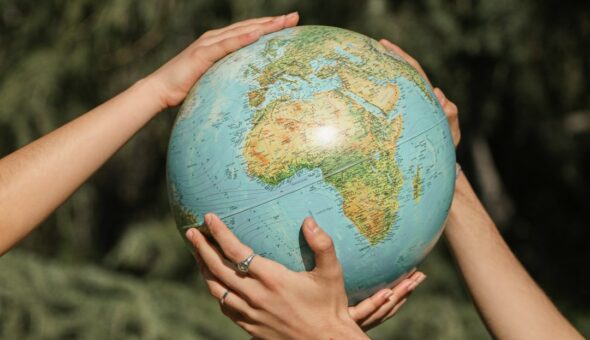To mark Human Rights Day on the tenth of December, we will spend this month exploring business and human rights. The Centre for Business, Organisations and Society will also host the webinar "Business and Human Rights: A scholarly contribution to the ‘decade of action’" where academics will share lessons from their research, revealing how businesses can implement effective human rights practices and policies.
Here Rita Mota explains that climate change is a human rights issue, and why framing it as such will help corporate leaders make better decisions.
Climate change is a human rights issue, but business leaders (indeed, most people) don’t always think of it that way. Of course, our planet is worth protecting in and of itself, but human survival and wellbeing is undeniably reliant on a safe, clean, healthy, and sustainable environment. However obvious this may sound, the link between the environment and human rights is not always acknowledged in business contexts, and a failure to understand that climate change is a human rights issue can lead to dangerous decisions.
Is climate change a human rights issue?
Climate change is already preventing many people around the world from living their lives with dignity, and this is inevitably going to become more serious and pervasive as global temperatures rise. People in Madagascar are starving, in what is being characterised as the world’s first climate-induced famine. In Pakistan and other parts of the world, temperature and humidity are crossing the threshold of what the human body can handle. Forest fires in Siberia this year threatened lives and livelihoods, and their carbon dioxide emissions made the air toxic. Extreme heat in Canada killed hundreds of people this summer. Floods in Germany and Belgium rendered thousands of people homeless and killed many. Indigenous people all over the world face multiple threats to their traditional way of life due to the effects of climate change - and the list goes on. Climate change is effectively interfering with human rights such as the right to life, to the enjoyment of the highest attainable standard of physical and mental health, to an adequate standard of living, to adequate food, to housing, to safe drinking water and sanitation, and to participation in cultural life.
Why is the link between climate and human rights underemphasised?
The UN Guiding Principles on Business and Human Rights, which are seen as the gold standard for business human rights conduct at the international level, do not explicitly link environmental protection to human rights. The UN Guiding Principles do appeal in broad terms to a wide range of rights recognised in international legal instruments, but environmental rights are a fairly recent and underdeveloped phenomenon. While a right to a healthy environment has been enshrined in the African Charter on Human and Peoples’ Rights for a long time, it was only this year that the UN Human Rights Council passed a (non-legally binding) resolution that recognises the right to a safe, clean, healthy and sustainable environment as a human right. So even companies that make a sincere effort to apply the UN Guiding Principles may fail to fully appreciate that climate change is a human rights issue. The link is just not very clearly established yet.
Why is it important to frame climate change as a human rights issue?
The way that we frame problems affects how we decide and what trade-offs we’re willing to make. When we’re faced with incompatible demands, it’s natural to prioritise whatever is most salient, especially if those demands feel qualitatively different. For example, a company that faces significant pressure to provide means to fight climate change may disregard broader human rights concerns that do not appear to be as important or pressing. This appears to be the case with many renewable energy companies, which have been accused of abuses such as the violation of indigenous rights and the denial of workers’ rights. On the other hand, a company that’s not providing goods and services that are directly relevant to climate action, but that’s genuinely concerned about its human rights conduct, may fail to identify weak spots in environmental performance. This disconnect is clear in the automotive industry, where many companies are performing fairly well in terms of non-environmental human rights, but very poorly in terms of environmental impact.
Balancing for a just transition
The transition to a net-zero economy is essential, but it needs to be just. The benefits of environmental gains must be shared widely, and no one should be left behind. If a just transition is to be achieved, business leaders (as well as governments) need to think holistically, and they need to recognise that climate change and human rights belong in the same category - they cannot be traded-off against each other lightly. Human rights courts often have to adjudicate between clashing human rights claims; when they do so, they frequently appeal to a notion of balancing. This balancing is aimed at compromise, rather than the establishment of a ranking that determines which right must “win.” If companies think of climate change and broader human rights concerns as belonging in the same category, they can much more effectively engage in this sort of balancing. What decisions will look like in practice when they are framed in this way is an open question - there is no one-size-fits-all answer. But I’m willing to bet that corporate leaders will make better decisions if they understand that climate change is a human rights issue.
Respond



